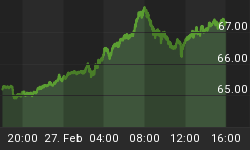Now that 2009 has passed into history, analysts have flooded the public with their opinions on how the events of the past year will impact the coming years. While most are optimistic, I feel that last year's developments have greatly exaggerated the imbalances in the U.S. economy. Although we may see a temporary respite from the turbulence, these mistakes will hinder our long-term viability. I fear that we have gone down a road that will destroy the value of the dollar and may even threaten the political stability of the United States.
While celebrating nominal gains in GDP, consumer confidence, and home prices, most commentators conveniently ignore the deep freeze that persists in the private credit markets. The lack of risk capital continues to strangle small businesses - the main creators of new jobs. The Administration has only worsened the situation by positioning itself as an enemy of business, creating great uncertainty among entrepreneurs. So moribund is the labor market that the economic boosters now cling to the oxymoronic hope of a "jobless recovery."
Rather than making any real changes that would portend recovery, Washington has entrenched failure. Two years after the recession began, consumption still accounts for about 70 percent of GDP. Even this economic activity has been made possible only by unprecedented "stimulus" spending. And even with the federal boost, retailers have been forced to protect market share with massive discounts, damaging future earnings. Therefore, the risk of a double-dip recession remains high.
Total unemployment, including those forced into part-time jobs, is approaching 20 percent. This suggests that employers are not seeing the profit opportunities that would justify new hires in the coming months or years.
Through it all, business on Wall Street remains largely unchanged. Washington has stepped in to provide cover for ongoing speculation by institutions that they have deemed to be "too big to fail." Furthermore, the feds have camouflaged the banks' de facto insolvency by permitting 'creative' accounting.
Investors retain some caution but have largely placed their faith in recovery. Forced by unrealistically low interest rates, investor funds are being thrust into bonds, real estate, and equities. Indeed, American stock markets have recovered some 60 percent of their 2008 nominal losses. Standing at the level of 1126 level, the S&P Index represents a P/E ratio of some 22 times forecast earnings. This is quite a premium for an economy teetering on a double dip due to the aforementioned factors.
Investing entails not just analyzing the current state of affairs, but trends. While the United States is still a measurably more liberal regime with more transparent markets and better administration of justice than its chief competitor, China, we are clearly trending toward socialism (while the PRC gallops the other way). Historically, socialism leads to economic ruin.
These worrying signs have not been lost on international investors. As we had predicted, in just the past year, the U.S. dollar has fallen significantly against other currencies that we have long championed (down 21% and 14% against the Australian and Canadian dollars, respectively). Measured against gold, between 2001 and 2008, the U.S. dollar depreciated by an average of some 18 percent compounded each year. In 2009, the dollar fell by an additional 30 percent against gold. We see no sign that these long term trends are abating; the sad truth is that they are likely to get worse.
Despite the upward pressure on bond yields, the Fed is likely to prove desperate in its resistance to raising interest rates. Such an increase would cause politically untenable increases in mortgage rates, social security costs, and Treasury debt funding costs. Above all, the Fed hopes to avoid an interest-rate led crisis in the vast derivatives markets. As a result, we can expect that an unjustifiably easy monetary policy will continue unchecked for the foreseeable future. In short, America is exhibiting economic behavior that in times past was practiced solely by dysfunctional banana republics. It can't be long before our living standards reflect this reality.
Looking back, those who invested in gold and non-U.S. dollar assets have survived this turbulent decade intact. Since 2009 did not herald fundamental changes, stay the course. Next year, either this Administration will choose to begin the restructuring process, however painful, or the "recovery" will quickly unravel.
For a more in-depth analysis of our financial problems and the inherent dangers they pose for the U.S. economy and U.S. dollar, read Peter Schiff's 2008 bestseller "The Little Book of Bull Moves in Bear Markets" and his newest release "Crash Proof 2.0: How to Profit from the Economic Collapse." Click here to learn more.
More importantly, don't let the great deals pass you by. Get an inside view of Peter's playbook with his new Special Report, "Peter Schiff's Five Favorite Investment Choices for the Next Five Years." Click here to dowload the report for free. You can find more free services for global investors, and learn about the Euro Pacific advantage, at www.europac.net.















